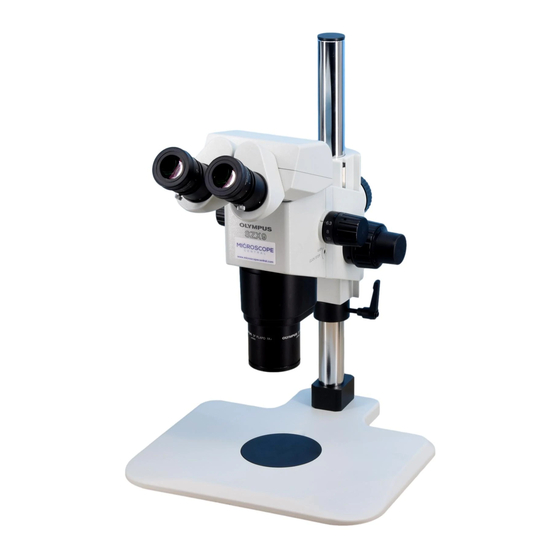Olympus SZX9 Talimatlar Kılavuzu - Sayfa 13
Mikroskop Olympus SZX9 için çevrimiçi göz atın veya pdf Talimatlar Kılavuzu indirin. Olympus SZX9 34 sayfaları. Research stereomicroscope system

²
@
Fig. 14
@
Fig. 15
9
Engagement and Disengagement of the
2
Zooming Knob Click Stop Function
}When the click stop knob is set to ON, the click stop function is engaged
for each magnification indicated with the zooming knob. When the knob
is set to OFF, the zoom magnification can be varied continuously and
finely near the click groove.
}A click stop can be provided for each of the 9 intermediate indications of
the zoom microscope body, regardless of the SZX-ZB12 or SZX-ZB9.
1. To engage the click stop function, rotate the click stop ON-OFF screw @
fully clockwise (in the direction of the arrow) using the Allen screwdriver.
The zooming knob then stops at every position corresponding to the
magnification indicated on the observation magnification indicator ².
2. To disengage the click stop function, rotate the click stop ON-OFF screw
@ fully clockwise (by one turn from the ON position, in the direction
opposite to the arrow) using the Allen screwdriver.
# Do not rotate too much, or the cover may be damaged.
Adjusting the Aperture Iris Diaphragm
3
(SZX-ZB12 only)
}Adjusting the aperture iris diaphragm increases the contrast of the
observed image as well as the depth of focus.
However, setting the aperture iris diaphragm too narrowly degrades
resolution.
1. Adjust the aperture iris diaphragm ring @ to the left or right.
Rotating the ring toward the left "\" opens the aperture; rotating it toward
the right " " closes it. Adjust while monitoring the observed image to
confirm the contrast and focal depth improvement effects.
# Do not close the aperture too much, for this may cause degradation
in resolution and/or lack of ambient light.
2. Use the scale gradations as references for memorizing the ring position.
# When the microscope is combined with the coaxial vertical illumi-
nator (SZX-ILLC), minimizing the aperture may obscure a part of the
observed field of view. In this case, open the aperture to an inter-
mediate position.
(Fig. 14)
(Fig. 15)
